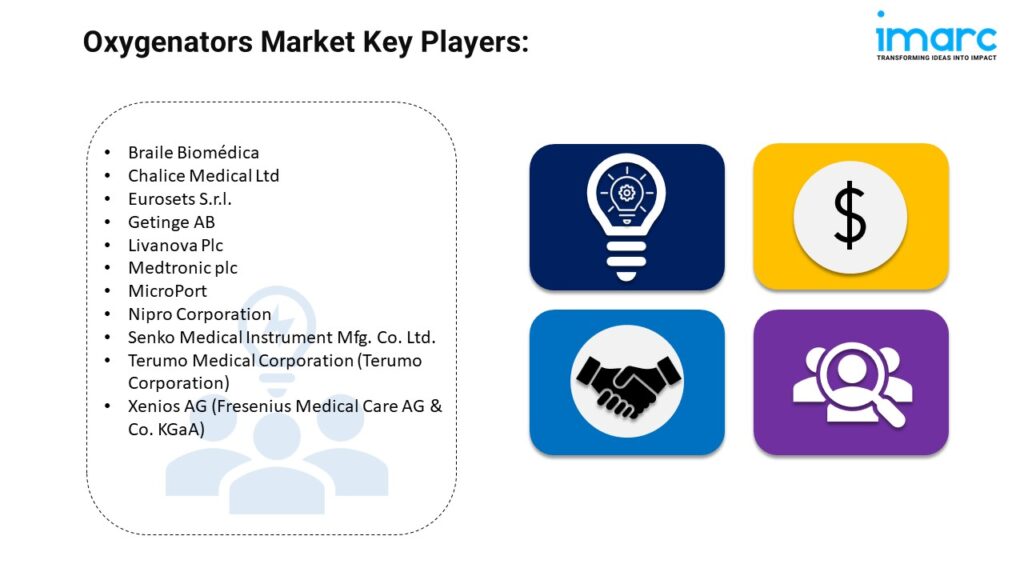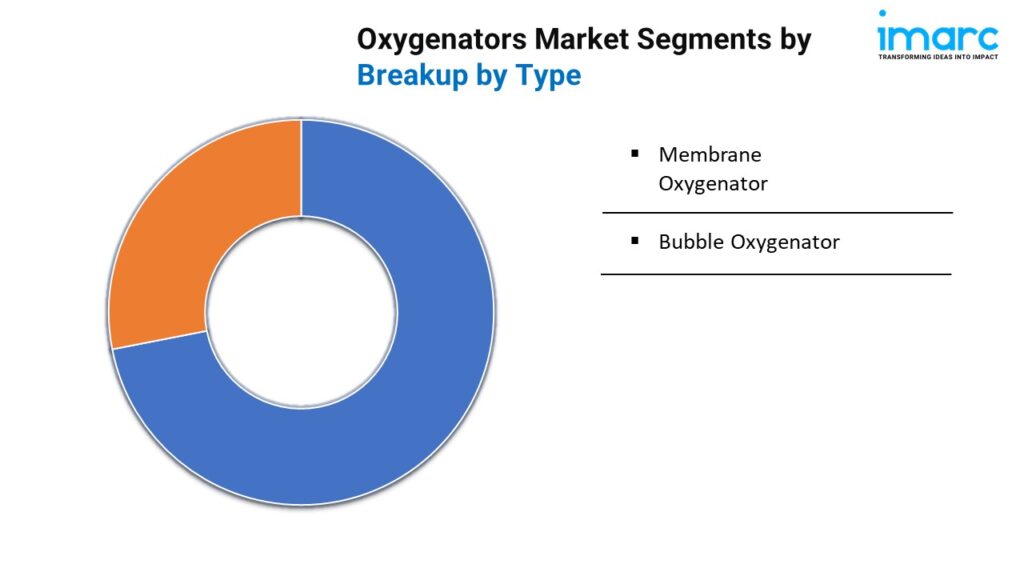Market Overview:
The oxygenator market is experiencing rapid growth, driven by rising prevalence of cardiopulmonary disorders, expanding elderly population, and strong government schemes and private sector response. According to IMARC Group’s latest research publication, “Oxygenators Market Size, Share, Trends and Forecast by Type, Age Group, Application, and Region, 2025-2033, the global oxygenator market size was valued at USD 271.9 Million in 2024. Looking forward, IMARC Group estimates the market to reach USD 419.52 Million by 2033, exhibiting a CAGR of 4.94% from 2025-2033.
This detailed analysis primarily encompasses industry size, business trends, market share, key growth factors, and regional forecasts. The report offers a comprehensive overview and integrates research findings, market assessments, and data from different sources. It also includes pivotal market dynamics like drivers and challenges, while also highlighting growth opportunities, financial insights, technological improvements, emerging trends, and innovations. Besides this, the report provides regional market evaluation, along with a competitive landscape analysis.
Download a sample PDF of this report: https://www.imarcgroup.com/oxygenators-market/requestsample
Our report includes:
- Market Dynamics
- Market Trends And Market Outlook
- Competitive Analysis
- Industry Segmentation
- Strategic Recommendations
Three Growth Factors Behind the Oxygenator Market
- Rising Prevalence of Cardiopulmonary Disorders
The surge in heart disease and respiratory disorders stands as a core engine powering the global oxygenator market. According to recent statistics, heart disease remains the world’s primary cause of cardiovascular-related deaths, while hospitals are seeing increased admissions for conditions requiring cardiopulmonary support. For instance, ischemic heart disease now contributes to an age-standardized mortality rate of over 108 deaths per 100,000 people globally. Asthma alone affects around 339 million individuals worldwide, with 1,000 people succumbing to it daily. These overwhelming numbers highlight the urgent, ongoing demand for reliable oxygenators, especially in critical and surgical care settings where effective oxygenation can dramatically impact survival rates and recovery outcomes.
- Expanding Elderly Population
The world’s rapidly growing geriatric population is significantly boosting demand for advanced medical devices, oxygenators included. As life expectancy rises and more individuals surpass 65 years old, chronic illnesses linked to aging—like cardiovascular disease, chronic obstructive pulmonary disease (COPD), and stroke—are on the rise. According to United Nations data, the global population aged 65 and above is expanding steadily, highlighting the need for long-term oxygen therapy and advanced cardiopulmonary care. Hospitals and care centers are ramping up investments in medical devices that ensure efficient patient support, which has pushed the market to values well above $270 million worldwide. Older adults frequently require oxygenation during surgeries, intensive care, and chronic disease management, further driving purchases by healthcare providers.
- Strong Government Schemes and Private Sector Response
Governments worldwide are fast-tracking policies and funding to enhance oxygen production and medical device innovation. India’s “Project O2” scheme and the Uttar Pradesh Oxygen Production Promotion Policy both aim to strengthen the nation’s capacity to meet rising medical oxygen demand. The Uttar Pradesh policy, for instance, supports investments of $6 million and above, awarding capital subsidies of 15–25% and full stamp duty exemptions in certain regions. Project O2 brings together a national consortium to support manufacturers with key supplies, raw materials like zeolites, and rapid plant setups. These initiatives, backed by major company launches—such as Medtronic’s VitalFlow ECMO System and OMRON’s portable concentrators—are making it easier to innovate and expand production while ensuring devices reach both hospitals and home-care environments during critical health crises.
Three Key Trends in the Global Oxygenator Market
- Shift to Membrane and Miniaturized Oxygenators
Membrane oxygenators are quickly outpacing older technologies, finding broad adoption in coronary bypass, extracorporeal life support, and open-heart surgeries. These devices are valued for reducing blood cell damage and clot formation, improving patient outcomes compared to traditional bubble oxygenators. The market has also seen launches like the LivaNova Essenz Perfusion System, which consolidates advanced membrane oxygenation into compact, integrated platforms for both adults and children. Meanwhile, Medtronic’s Prismaflex Elite received FDA approval as a miniaturized oxygenator, tailored for portable extracorporeal membrane oxygenation (ECMO) systems and smaller procedure suites. This shift lets hospitals deliver cardiopulmonary support with fewer complications and greater flexibility, meeting demand from critical care units and modern surgical centers.
- Intense Focus on Innovation and Strategic Partnerships
Leading companies are doubling down on product innovation and collaborations. For example, Medtronic’s VitalFlow ECMO System boasts an intuitive touch screen and performance data centralization, representing a leap in clinical interface and safety. Getinge’s acquisition of Talis Clinical expanded its digital portfolio, enhancing critical care decision support. On a different front, Inspira Technologies’ VORTX system recently secured a U.S. patent for an orbiting blood oxygenator that could reduce blood trauma and lower maintenance needs. These innovations, backed by strategic alliances among medical device leaders, are shaping how next-generation oxygenators are designed, delivered, and maintained, resulting in faster market adoption and broader clinical acceptance.
- Surge in Home and Non-Hospital Applications
There’s a clear pivot toward oxygenator devices designed for home-based and portable use. The COVID-19 pandemic exposed deep gaps in hospital oxygen supply, leading companies like OMRON Healthcare to release portable oxygen concentrators capable of delivering 5L of oxygen per minute at over 90% concentration. Government-backed policies and incentives now support the mass production of concentrators and cylinders for at-home therapy. As outpatient management of chronic respiratory conditions like COPD rises, and with more patients seeking medical-grade equipment at home, global manufacturers and startups are responding with compact, user-friendly devices—ensuring access in both developed and emerging markets. This trend has fundamentally altered distribution strategies and device design in the oxygenator industry.
The Oxygenators market report provides a comprehensive overview of the industry. This analysis is essential for stakeholders aiming to navigate the complexities of the biochar market and capitalize on emerging opportunities.
Leading Companies Operating in the Global Oxygenators Industry:

- Braile Biomédica
- Chalice Medical Ltd
- Eurosets S.r.l.
- Getinge AB
- Livanova Plc
- Medtronic plc
- MicroPort
- Nipro Corporation
- Senko Medical Instrument Mfg. Co. Ltd.
- Terumo Medical Corporation (Terumo Corporation)
- Xenios AG (Fresenius Medical Care AG & Co. KGaA)
Oxygenators Market Report Segmentation:
By Type:

- Membrane Oxygenator
- Bubble Oxygenator
Membrane Oxygenator dominates the market due to high performance, versatility, and increased demand from cardiovascular and respiratory diseases, along with advancements in membrane technology and growing ECMO usage.
By Age Group:
- Neonates
- Pediatric
- Adults
Adults dominates the market due to high cardiovascular and respiratory disease rates, with aging populations and lifestyle factors driving demand for advanced oxygenator technologies.
By Application:
- Respiratory
- Cardiac
- Extracorporeal Cardiopulmonary
- Resuscitation (ECPR)
Respiratory leads the market at 59.3% share, driven by the rise in respiratory diseases and pollution, with ECMO therapy adoption and advancements in oxygenator technology enhancing long-term support.
Regional Insights:
- North America (United States, Canada)
- Asia Pacific (China, Japan, India, South Korea, Australia, Indonesia, Others)
- Europe (Germany, France, United Kingdom, Italy, Spain, Russia, Others)
- Latin America (Brazil, Mexico, Others)
- Middle East and Africa
North America holds 45.3% market share, fueled by advanced healthcare infrastructure, high disease prevalence, aging population, and robust R&D, along with favorable reimbursement policies.
Research Methodology:
The report employs a comprehensive research methodology, combining primary and secondary data sources to validate findings. It includes market assessments, surveys, expert opinions, and data triangulation techniques to ensure accuracy and reliability.
Note: If you require specific details, data, or insights that are not currently included in the scope of this report, we are happy to accommodate your request. As part of our customization service, we will gather and provide the additional information you need, tailored to your specific requirements. Please let us know your exact needs, and we will ensure the report is updated accordingly to meet your expectations.
About Us:
IMARC Group is a global management consulting firm that helps the world’s most ambitious changemakers to create a lasting impact. The company provide a comprehensive suite of market entry and expansion services. IMARC offerings include thorough market assessment, feasibility studies, company incorporation assistance, factory setup support, regulatory approvals and licensing navigation, branding, marketing and sales strategies, competitive landscape and benchmarking analyses, pricing and cost research, and procurement research.
Contact Us:
IMARC Group
134 N 4th St. Brooklyn, NY 11249, USA
Email: sales@imarcgroup.com
Tel No:(D) +91 120 433 0800
United States: +1-631-791-1145
